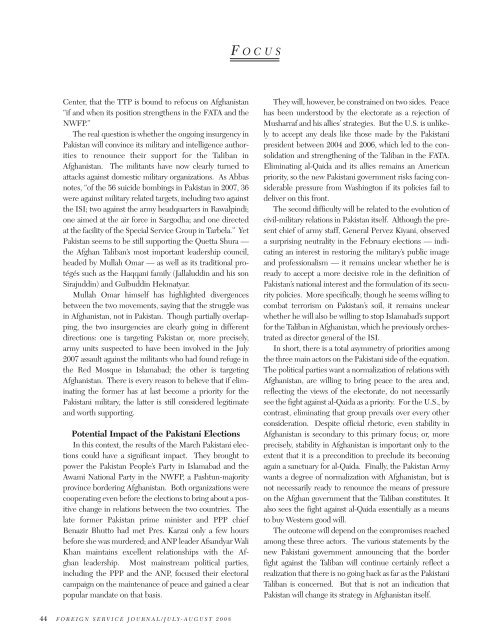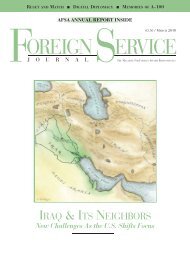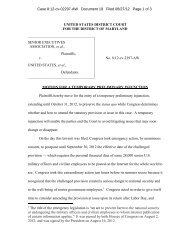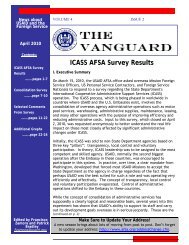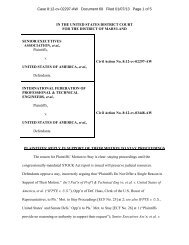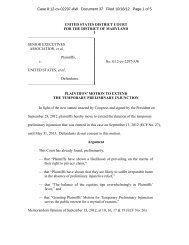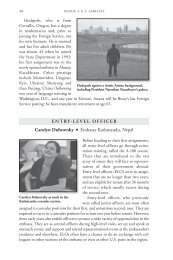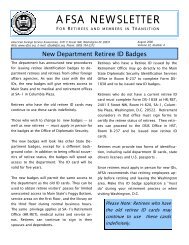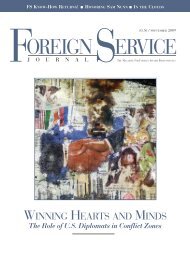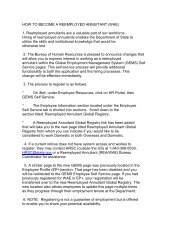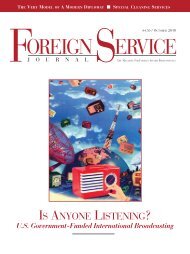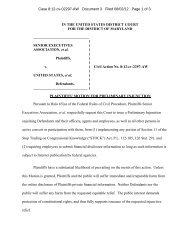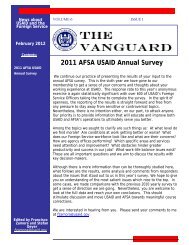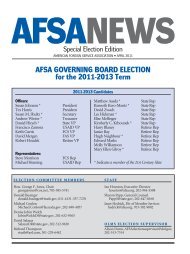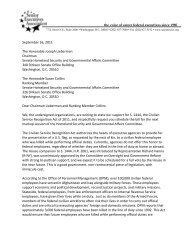F OCUS - American Foreign Service Association
F OCUS - American Foreign Service Association
F OCUS - American Foreign Service Association
Create successful ePaper yourself
Turn your PDF publications into a flip-book with our unique Google optimized e-Paper software.
Center, that the TTP is bound to refocus on Afghanistan<br />
“if and when its position strengthens in the FATA and the<br />
NWFP.”<br />
The real question is whether the ongoing insurgency in<br />
Pakistan will convince its military and intelligence authorities<br />
to renounce their support for the Taliban in<br />
Afghanistan. The militants have now clearly turned to<br />
attacks against domestic military organizations. As Abbas<br />
notes, “of the 56 suicide bombings in Pakistan in 2007, 36<br />
were against military related targets, including two against<br />
the ISI; two against the army headquarters in Rawalpindi;<br />
one aimed at the air force in Sargodha; and one directed<br />
at the facility of the Special <strong>Service</strong> Group in Tarbela.” Yet<br />
Pakistan seems to be still supporting the Quetta Shura —<br />
the Afghan Taliban’s most important leadership council,<br />
headed by Mullah Omar — as well as its traditional protégés<br />
such as the Haqqani family (Jallaluddin and his son<br />
Sirajuddin) and Gulbuddin Hekmatyar.<br />
Mullah Omar himself has highlighted divergences<br />
between the two movements, saying that the struggle was<br />
in Afghanistan, not in Pakistan. Though partially overlapping,<br />
the two insurgencies are clearly going in different<br />
directions: one is targeting Pakistan or, more precisely,<br />
army units suspected to have been involved in the July<br />
2007 assault against the militants who had found refuge in<br />
the Red Mosque in Islamabad; the other is targeting<br />
Afghanistan. There is every reason to believe that if eliminating<br />
the former has at last become a priority for the<br />
Pakistani military, the latter is still considered legitimate<br />
and worth supporting.<br />
Potential Impact of the Pakistani Elections<br />
In this context, the results of the March Pakistani elections<br />
could have a significant impact. They brought to<br />
power the Pakistan People’s Party in Islamabad and the<br />
Awami National Party in the NWFP, a Pashtun-majority<br />
province bordering Afghanistan. Both organizations were<br />
cooperating even before the elections to bring about a positive<br />
change in relations between the two countries. The<br />
late former Pakistan prime minister and PPP chief<br />
Benazir Bhutto had met Pres. Karzai only a few hours<br />
before she was murdered; and ANP leader Afsandyar Wali<br />
Khan maintains excellent relationships with the Afghan<br />
leadership. Most mainstream political parties,<br />
including the PPP and the ANP, focused their electoral<br />
campaign on the maintenance of peace and gained a clear<br />
popular mandate on that basis.<br />
44 FOREIGN SERVICE JOURNAL/JULY-AUGUST 2008<br />
F <strong>OCUS</strong><br />
They will, however, be constrained on two sides. Peace<br />
has been understood by the electorate as a rejection of<br />
Musharraf and his allies’ strategies. But the U.S. is unlikely<br />
to accept any deals like those made by the Pakistani<br />
president between 2004 and 2006, which led to the consolidation<br />
and strengthening of the Taliban in the FATA.<br />
Eliminating al-Qaida and its allies remains an <strong>American</strong><br />
priority, so the new Pakistani government risks facing considerable<br />
pressure from Washington if its policies fail to<br />
deliver on this front.<br />
The second difficulty will be related to the evolution of<br />
civil-military relations in Pakistan itself. Although the present<br />
chief of army staff, General Pervez Kiyani, observed<br />
a surprising neutrality in the February elections — indicating<br />
an interest in restoring the military’s public image<br />
and professionalism — it remains unclear whether he is<br />
ready to accept a more decisive role in the definition of<br />
Pakistan’s national interest and the formulation of its security<br />
policies. More specifically, though he seems willing to<br />
combat terrorism on Pakistan’s soil, it remains unclear<br />
whether he will also be willing to stop Islamabad’s support<br />
for the Taliban in Afghanistan, which he previously orchestrated<br />
as director general of the ISI.<br />
In short, there is a total asymmetry of priorities among<br />
the three main actors on the Pakistani side of the equation.<br />
The political parties want a normalization of relations with<br />
Afghanistan, are willing to bring peace to the area and,<br />
reflecting the views of the electorate, do not necessarily<br />
see the fight against al-Qaida as a priority. For the U.S., by<br />
contrast, eliminating that group prevails over every other<br />
consideration. Despite official rhetoric, even stability in<br />
Afghanistan is secondary to this primary focus; or, more<br />
precisely, stability in Afghanistan is important only to the<br />
extent that it is a precondition to preclude its becoming<br />
again a sanctuary for al-Qaida. Finally, the Pakistan Army<br />
wants a degree of normalization with Afghanistan, but is<br />
not necessarily ready to renounce the means of pressure<br />
on the Afghan government that the Taliban constitutes. It<br />
also sees the fight against al-Qaida essentially as a means<br />
to buy Western good will.<br />
The outcome will depend on the compromises reached<br />
among these three actors. The various statements by the<br />
new Pakistani government announcing that the border<br />
fight against the Taliban will continue certainly reflect a<br />
realization that there is no going back as far as the Pakistani<br />
Taliban is concerned. But that is not an indication that<br />
Pakistan will change its strategy in Afghanistan itself.


